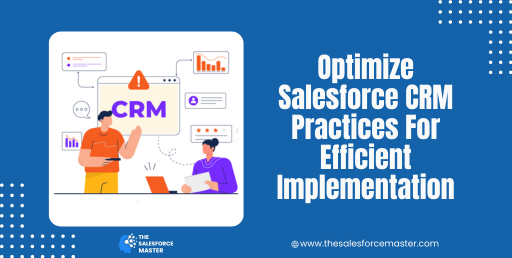
Salesforce CRM is a powerful tool for businesses aiming to streamline their customer relationship management.
Efficient implementation of Salesforce CRM ensures that organizations reap maximum benefits from this robust platform. By following best practices, Salesforce marketers can optimize their processes and enhance overall productivity.
Define Clear Objectives: Before diving into Salesforce implementation, it is crucial to define clear objectives. Organizations should identify their specific needs and how Salesforce can address them. Goals must be set for what the CRM should achieve, such as improving customer service, enhancing marketing efforts, or increasing sales efficiency. By having a well-defined roadmap, Salesforce marketers can tailor the implementation to meet their business requirements.
Customize for Your Needs: Salesforce CRM offers a high level of customization to fit various business needs. Customizing Salesforce ensures that the system aligns with the unique workflows of the organization. This includes creating custom objects, fields, and layouts that reflect the company’s processes. It is essential to involve key stakeholders in this customization process to ensure the system supports all necessary functions. Customization makes the CRM more intuitive and useful for end users, which can significantly boost adoption rates.
Ensure Data Quality: Effective data management is the backbone of a successful Salesforce implementation. Before migrating data to Salesforce, it is crucial to clean and de-duplicate existing data. Poor data quality can lead to inefficiencies and inaccurate reporting. Salesforce marketers should establish data governance policies to maintain high data quality. Regular audits and data cleansing processes help in keeping the CRM system reliable and valuable.
Leverage Data Analytics: Salesforce CRM provides powerful analytics tools that help in making informed decisions. By leveraging Salesforce’s reporting and dashboard capabilities, organizations can gain insights into their sales and marketing performance. These tools enable marketers to track key performance indicators (KPIs) and identify trends. Using data-driven insights, Salesforce marketers can refine their strategies and drive better business outcomes.
Invest in Training Programs: For successful Salesforce implementation, investing in comprehensive training programs for end users is vital. Employees must be trained on how to use the system effectively. Tailored training sessions that focus on the specific needs of different user groups can enhance the overall proficiency with the CRM. Well-trained users are more likely to leverage the full capabilities of Salesforce, leading to increased productivity and better utilization of the platform.
Provide Ongoing Support: After the initial training, ongoing support should be provided to address any issues or questions that arise. Establishing a support system, such as a help desk or dedicated support team, can assist users in resolving problems quickly. Continuous support ensures that users remain engaged and confident in using Salesforce, which can lead to higher adoption rates and more consistent usage.
Conclusion:
Efficient implementation of Salesforce CRM requires a strategic approach, focusing on planning, customization, data management, user training, and continuous improvement. By following these best practices, Salesforce marketers can ensure their CRM system is optimized to drive business success. Regular updates and ongoing support will keep the system robust and aligned with organizational goals, leading to a significant return on investment.


